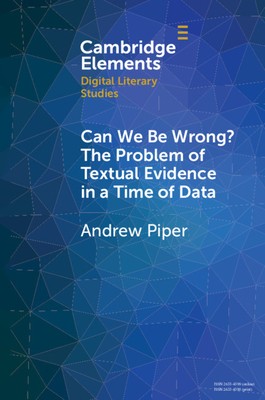
- We will send in 10–14 business days.
- Author: Andrew Pyper
- Publisher: Cambridge University Press
- ISBN-10: 1108926207
- ISBN-13: 9781108926201
- Format: 15.2 x 22.9 x 0.5 cm, softcover
- Language: English
- SAVE -10% with code: EXTRA
Can We Be Wrong? the Problem of Textual Evidence in a Time of Data (e-book) (used book) | bookbook.eu
Reviews
Description
This Element tackles the problem of generalization with respect to text-based evidence in the field of literary studies. When working with texts, how can we move, reliably and credibly, from individual observations to more general beliefs about the world? The onset of computational methods has highlighted major shortcomings of traditional approaches to texts when it comes to working with small samples of evidence. This Element combines a machine learning-based approach to detect the prevalence and nature of generalization across tens of thousands of sentences from different disciplines alongside a robust discussion of potential solutions to the problem of the generalizability of textual evidence. It exemplifies the way mixed methods can be used in complementary fashion to develop nuanced, evidence-based arguments about complex disciplinary issues in a data-driven research environment.
EXTRA 10 % discount with code: EXTRA
The promotion ends in 14d.22:32:33
The discount code is valid when purchasing from 10 €. Discounts do not stack.
- Author: Andrew Pyper
- Publisher: Cambridge University Press
- ISBN-10: 1108926207
- ISBN-13: 9781108926201
- Format: 15.2 x 22.9 x 0.5 cm, softcover
- Language: English English
This Element tackles the problem of generalization with respect to text-based evidence in the field of literary studies. When working with texts, how can we move, reliably and credibly, from individual observations to more general beliefs about the world? The onset of computational methods has highlighted major shortcomings of traditional approaches to texts when it comes to working with small samples of evidence. This Element combines a machine learning-based approach to detect the prevalence and nature of generalization across tens of thousands of sentences from different disciplines alongside a robust discussion of potential solutions to the problem of the generalizability of textual evidence. It exemplifies the way mixed methods can be used in complementary fashion to develop nuanced, evidence-based arguments about complex disciplinary issues in a data-driven research environment.


Reviews